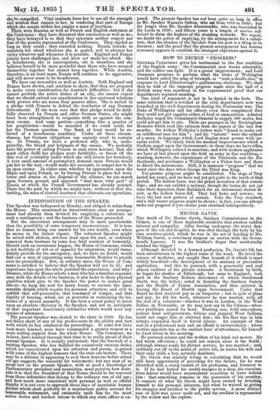HECTOR GAVIN.
THE death of Dr. Hector Gavin, Sanitary Commissioner in the Crimea, is one of those deplorable accidents that awaken sudden interest and sympathy. After having undergone the worst dan- gers of the sea and hospital, he was shot through the body by his own revolver-pistol, which he was in the actef banding to Mr. William Gavin, a veterinary surgeon on service with the Seven- teenth Lancers. It was the brother's finger that accidentally touched the trigger !
Although devoted to a learned profession, Dr. Gavin's life has been adventurous in the highest sense of the word. He loved the science of medicine, and sought that branch of it which is most widely beneficial—the development of its sanitary or preventive application. And this he pursued, with a generosity and zeal almost reckless of his private interests. A Scotchman by birth, he began his studies at Edinburgh, but came to England; took part in the Sanitary Reform movement of which Southwood Smith was the father ; aided in founding the Sanitary Society and the Health of Towns Association, and thus assisted in forcing the Board of Health upon Government. Under that Board he first received pay as an Inspector ; but in spite of place and pay, he did his work, wherever he was wanted, with all I the zeal of a volunteer—whether it was in London, in the West Indies, in Newcastle, or we may now say in the Crimea—wher- ever pestilence reared its head. Burning sun, fetid atmosphere, jealous local self-governors, bilious and peppery West Indiana, could not anger him or obstruct him ; the fire that was in him always expended itself in fervid • labour. An example of this zeal in a professional man and an officrig is extraordinary : where routine appoints ten as the earliest hour of attendance, for himself he fixed seven in the morning.
He pursued science and the welfare of his kind, not money. He had warm affections ; he could not remain alone in the world : although always ready for distant service, he was married ; an suddenly cut off in the midst of active life, he leaves his wife their only child, a boy, actually destitute.
Dr. Gavin was scarcely wrong in calculating that he would still have opportunity of providing for the future; for he was identified with a rising branch of his profession, and foremost in it. If he had buried his useful energies in a shop, his conscien- tious labour would have accumulated something to leave behind him : that something remains in the possession of his country. It consists of what Dr. Gavin might possession
earned by devoting himself to his personal interests, but what he waived in diving his energies and intellect to the public service. A more distinct ease of debt was never made out, and the creditor is represented


























 Previous page
Previous page